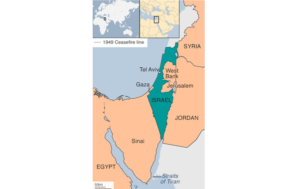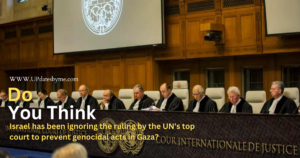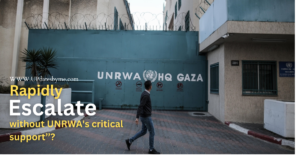Why doesn’t Israel remove everyone from Gaza and annex it? “international law”
One of the most persistent questions in the unstable Middle East is why Israel hasn’t annexed Gaza. International law acts as a crucial check on territorial ambitions. This article explores the nuances of this complicated topic and how international law has influenced Israel’s policy in Gaza.
The Importance of Global Governance: The framework for relations between states, including questions of sovereignty, territorial integrity, and human rights, is established by international law. Because of the delicate geopolitical dynamics and long history of hostilities in the region, respect to international law rules is crucial in the situation of Gaza.
Sovereignty and Self-Determination: The rights of states to self-determination and sovereignty are protected by fundamental principles of international law. Without the residents’ permission, annexing Gaza would go against these ideals, possibly leading to broad censure and diplomatic seclusion.
Humanitarian Aspects:Beyond legal requirements, humanitarian considerations play a significant role in the decision-making process. A humanitarian disaster would arise from the forced evacuation of Gaza’s people, escalating already high tensions and adding to the region’s instability.
Diplomatic Implications: Israel is under constant international scrutiny for its actions, and any move for annexation would be met with fierce diplomatic criticism. International law violations may result in penalties, tense diplomatic relations, and diminished legitimacy.
Strategic Calculations: Israel’s circumspect attitude to Gaza is a reflection of strategic considerations meant to uphold stability in the area and safeguard its reputation abroad. Israel traverses challenging geopolitical terrain while upholding international law, attempting to address security issues, and pursuing peaceful conflict resolution.
Why doesn’t Israel annex the Gaza strip and provide Palestinians living there with a reasonable life?
There are concerns regarding why Israel hasn’t annexed the Gaza Strip in order to better the lives of Palestinians, given that the area is a focal point in the Israeli-Palestinian conflict. Investigating this matter shows how complex relationships exist between humanitarian concerns, geopolitical realities, and international legal restrictions.

Comprehending International Law: The fundamental tenets of sovereignty, territorial integrity, and human rights are all shaped by international law. Given the region’s delicate geopolitical dynamics and unique historical backdrop, Gaza must comply to international law rules.
Sovereignty and Self-Determination: The rights of states to self-determination and sovereignty are protected by fundamental principles of international law. These values would be broken by annexing Gaza without the approval of its Palestinian residents, which would escalate tensionsand resulting in broad criticism.
Humanitarian Imperatives: In addition to legal concerns, humanitarian issues are given significant weight when making decisions. For Palestinians, annexation does not provide a decent life. Rather, comprehensive solutions and international cooperation are needed to address systemic concerns like poverty, unemployment, and access to basic services.
Complexities in Governance: By annexing Gaza, one would be taking on responsibility for the well-being of its people, which would include supplying jobs, infrastructure, healthcare, and education. But managing a place as politically divided and densely crowded as Gaza has enormous obstacles that need for rigorous preparation and collaboration.
Diplomatic Repercussions: Any attempt toward annexation is subject to intensive diplomatic scrutiny, and Israel’s actions in Gaza are constantly monitored on the international scene. The pursuit of peace and stability in the region could be harmed by international law violations, which could lead to penalties, strained diplomatic relations, and increased tensions.
Strategic Considerations: Israel’s hesitation to annex Gaza is the result of strategic calculations meant to strike a balance between the goal of peace, diplomatic ties, and security concerns. In the face of continued hostilities and geopolitical pressures, upholding international law while attending to Palestinian needs continues to be a difficult balancing act.
Do you think Israel has been ignoring the ruling by the UN’s top court to prevent genocidal acts in Gaza?
The United Nations’ highest court’s decision to stop acts of genocide in Gaza has spurred discussions over Israel’s adherence to international law. This article explores Israel’s position on the decision and how it relates to international law.

Comprehending the Genocide Prevention Decision of the UN: In a decision, the International Court of Justice (ICJ) emphasized that all governments have an obligation under international law to avoid genocide and called for steps to be taken to stop acts of genocidal violence in Gaza. The decision emphasizes how crucial it is to protect human rights and stop crimes in areas of conflict.
Israel’sReaction: Israel has disputed the International Court of Justice’s jurisdiction over the issue, claiming that the court is not equipped to decide cases involving the Israeli-Palestinian conflict. Israel insists that it respects and follows international law human rights norms in its military actions in Gaza, highlighting its right to self-defense in the face of threats from extremist organizations.
Evaluating International Law Compliance: Some who oppose Israel’s military efforts in Gaza contend that these actions, which include airstrikes and blockades, may violate international humanitarian law and might create an environment that is favorable to genocide. The International Court of Justice’s decision emphasizes how important it is that all sides to the conflict follow international law and protect civilian rights.
The Israeli-Palestinian Conflict’s Complexities: Deep-seated historical, political, and religious tensions characterize the Israeli-Palestinian conflict, making efforts to find a long-term settlement more difficult. Although there is a framework for resolving disputes and encouraging peaceful coexistence provided by international law, its implementation frequently encounters serious difficulties.
The verdict of the International Court of Justice (ICJ) bears significant diplomatic and legal ramifications for Israel’s dealings with the global community, as well as for the wider efforts to uphold justice and accountability in areas of conflict. Respecting the fundamentals of international law is crucial to building mutual confidence and collaboration between states as well as stability in conflict-affected areas.
Do you believe that the situation in Gaza will “rapidly escalate without UNRWA’s critical support”?
There are still many unanswered questions and worries about a possible escalation of the situation in Gaza. The significance of the United Nations Relief and Works Agency for Palestine Refugees (UNRWA) in stabilizing Gaza is explored in detail in this article, along with its legal ramifications.

UNRWA’s Vital Assistance: UNRWA offers Gaza’s Palestinian refugees vital humanitarian aid, including social services, healthcare, and education. In order to address the socioeconomic issues that Gaza’s people faces and reduce the likelihood of additional destabilization, the agency’s presence is essential.
Risks of Escalation: The situation in Gaza could quickly worsen without UNRWA’s vital assistance, escalating humanitarian crises and ratcheting up regional tensions. Lack of access to essential services and employment opportunities may exacerbate unrest and feed discontent, possibly resulting in more violence and unease.
International Law Imperatives: Under international law, states and international organizations are required to protect and assist displaced people, as well as to acknowledge the rights of refugees. These legal precepts form the basis of UNRWA’s mandate and emphasize the significance of respecting human rights as well as the dignity and welfare of Palestinian refugees in Gaza.
Legal Responsibilities and Obligations: Under international law, states are required by law to assist populations in need, especially refugees, and to support humanitarian initiatives. The international community carries out its obligations and shows that it is committed to maintaining international legal standards and values by supporting UNRWA’s operations in Gaza.
Diplomatic and Political Aspects: Given the Israeli-Palestinian conflict, broader diplomatic and political factors are reflected in the organization’s sustained support for UNRWA. Following the precepts of international law and human rights, continuous international engagement and partnership are necessary to address the root causes of Gaza’s instability.
What is your reaction to the proposal of limiting the amount of aid reaching Gaza in order to weaken Hamas?
One suggestion that has surfaced in recent talks is to restrict the amount of aid that goes to Gaza in an effort to undermine Hamas, which is now in charge of the region. There are serious concerns regarding this proposal’s humanitarian effects and compliance with international law.
International Law Considerations: Providing humanitarian aid to civilian populations is seen as a basic principle under international law, regardless of political allegiance. Reducing aid to Gaza might go against these legal requirements, which could result in human rights abuses and worsen the region’s humanitarian predicament.
Humanitarian Implications: Gaza is already experiencing extreme poverty, poor healthcare, and restricted access to needs. The living conditions of its residents would deteriorate further with any cut in aid, disproportionately harming the most vulnerable, such as children, the elderly, as well as the ill.
Security Concerns: Although countering Hamas’s security risks is right, it might not be the best or most moral course of action to target civilian populations with restrictions on aid. Such activities may encourage animosity and radicalism, which would ultimately undermine the region’s long-term security goals.
Alternative Approaches: In order to address security concerns while respecting international legal norms and safeguarding civilian populations, alternative approaches should be investigated as opposed to restricting aid. In order to reduce security vulnerabilities, diplomatic initiatives, focused sanctions, and cooperation with regional players might be more long-term options.
To sum up, the plan to restrict aid to Gaza poses a difficult conundrum that strikes a balance between security considerations, humanitarian ideals, and international law. As important as it is to confront the threat posed by Hamas, any action that is done must respect the rights and welfare of the civilian population of Gaza. Alternative approaches that uphold legal requirements and advance stability and security ought to be investigated.
It’s crucial to remain informed and have productive conversations as you navigate discussions surrounding this divisive topic. For additional information on connected subjects, view our earlier blog post: Why is there a discrepancy in recognition between Palestine and Israel?
Additionally, take a look at Hostinger, a reputable web host, if you want to improve the functionality of your website or create an online presence. Hostinger can assist you in efficiently creating and managing your website with its dependable services and intuitive features. Use this link to recommend Hostinger to learn more about it and its products: Hostinger
We appreciate your interest in our content and invite you to keep delving deeper into and having serious, well-informed conversations about important topics.